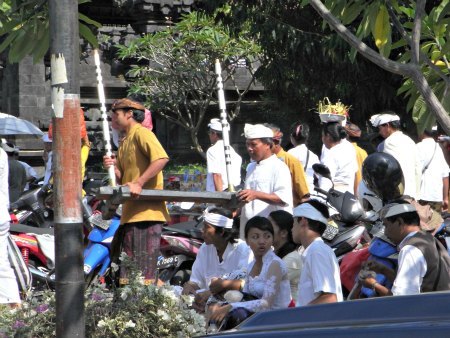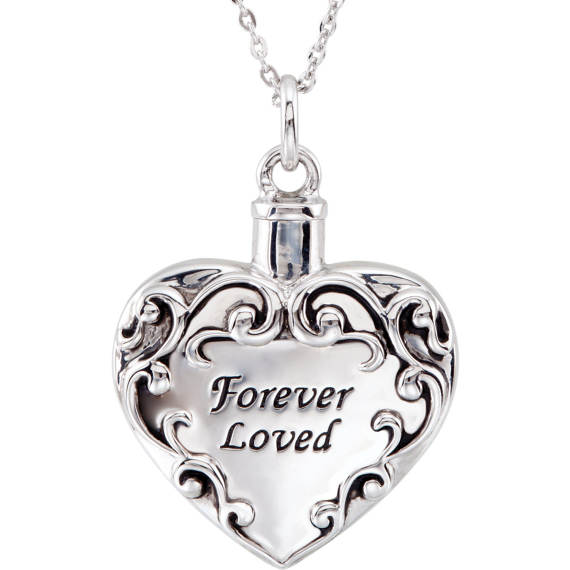What Can We Learn From Rituals of Death in Other Cultures?
Grief expert Elizabeth Postle considers rituals of death in other cultures and wonder what we in the West can learn from them.
In Western societies we have changed our ways of dealing with death over the years, so that nowadays it is very private and hidden. In my view this is not such a good thing.
So called sophisticated societies today try to hide death. They make it very private and out of sight. It used to be that the loved one would be in the home. There would be a wake and neighbours would come in to say their goodbyes. They would weep with the family and help with the grief.
There would be long rows of cars following the funeral cortege and people in the street would stop to show their respect. Men removed their hats. Traffic would stop for them.
Today, loved ones are taken to a chapel of rest. Those who wish to can go there to say their farewells but there are no longer a stream of people coming in and out of the home to pay their respects. Family and friends arrive at the venue for the funeral or celebration of life in their own cars. Rarely are long lines of cars seen behind hearses today.
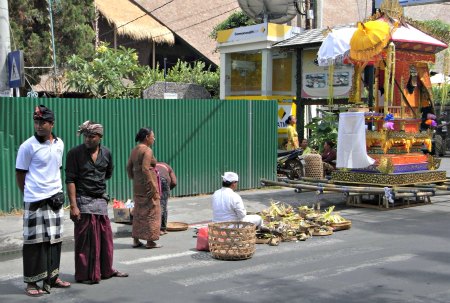 Preparing for a cremation in the middle of the street, Sanur, Bali
Preparing for a cremation in the middle of the street, Sanur, BaliDealing with Death Publicly Can Be Beneficial
Many neighbours today don’t even know there has been a death in the street. Children don’t see these facts of death anymore. Perhaps the only scenes that remind us and children of the loss of loved ones these days are the Anzac Day or Remembrance Day parades or the huge public displays of grief that occasionally happen when a celebrity dies, such as happened after Princess Diana's death.
It is a good thing for people to have at least some exposure to death. Those that go to pay their respects at Gallipoli, for example, are doing themselves a service in helping to get used to the idea of their own mortality.
Death in Other Cultures
During a trip to Asia I saw shops selling coffins all displayed around the outside of the shops in the middle of the street. In our society we have a small brochure shown to us by the funeral director.
Some Pacific Islanders bury their parents in the garden. The houses pass on to other members of the family. There is a shrine to the parents permanently there. Life and death are regarded as a natural pattern of events.
Recently I read an article about a remote community in Sulawesi, Indoniesia where the deceased loved one is embalmed and kept in the house for months after they have died, as if they were still living there. "When Death Doesn't Mean Goodbye" This is quite an extreme example, but it means that they can get used to the idea that the person is gone much more gradually.
Death Rituals in Different Cultures
In Bali on holiday a few years ago we got stuck in a traffic jam because there was a communal cremation of a thousand people going on at one of the main temples. The entire community of a city was there.
There, bodies are usually buried for a long period of time, usually a couple of years, and then dug up and cremated. As cremation is an expensive business, it can take that long for families to save up enough to hold one and often they end up selling valued possession or even land to do so. That is why now communal ceremonies are often held so that people can cremate their loved ones, sometimes after many years. Though a big cremation is still a sign of status and important to families.
More recently, we saw a cremation being held right next to the beach, metres away from tourists sunbathing. It was a very serious affair with a priest chanting and lots of food laid out, and the gamelan orchestra playing. But at the same time, it had a sense of normal life. People sitting on the street watching and chatting. Perhaps dealing with death in this way helps to bring acceptance.
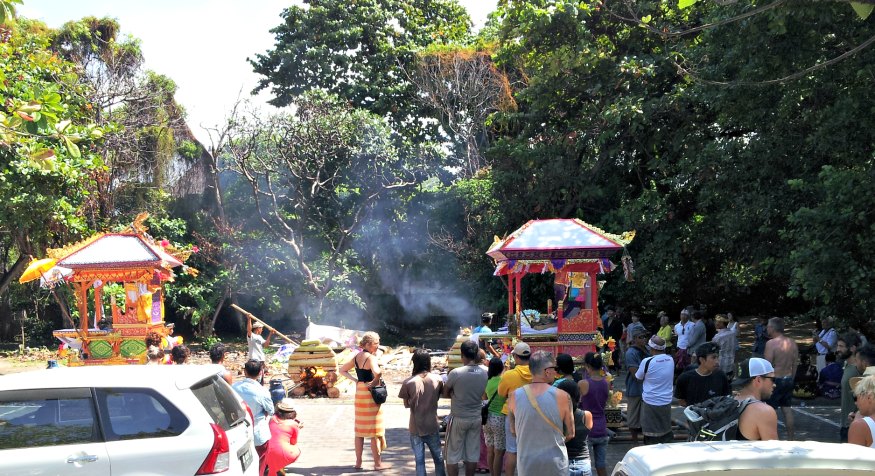 Tourists from the beach look on as the cremation pyre is prepared
Tourists from the beach look on as the cremation pyre is prepared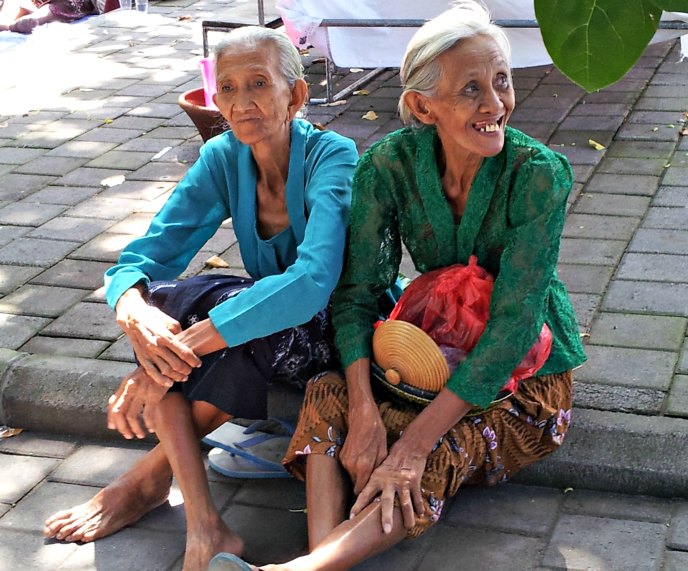 Balinese ladies watching the preparations for the cremation
Balinese ladies watching the preparations for the cremation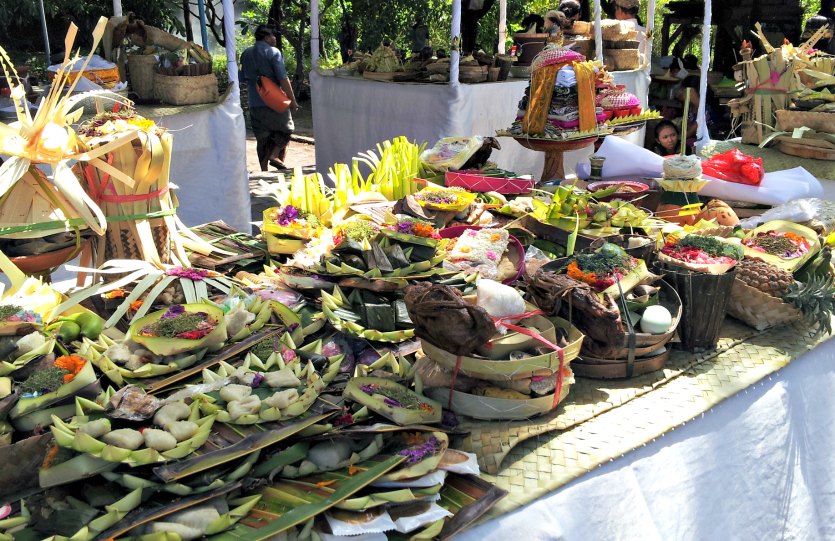 Offerings piled up for the Gods
Offerings piled up for the Gods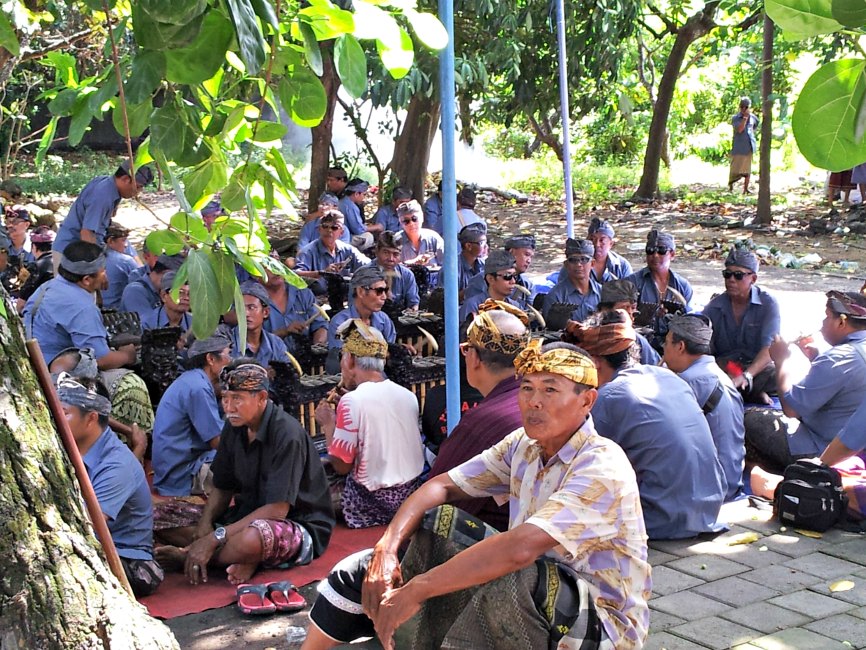 Gamelan musicians playing while the cremation pyre is prepared
Gamelan musicians playing while the cremation pyre is preparedDeath in Western Culture
I have spoken to elderly people who have never seen a dead loved one. Some families never let their female members or children attend the funeral, as if trying to protect them from the events.
People are often afraid of talking about a dead loved one, afraid of the bereaved getting upset and unable to help them when they do. They are afraid of showing their own emotions and giving a shoulder to cry on.
Death is becoming increasingly hidden in real life in the West as if we are trying to deny it will happen to us or to our families.
When people do lose someone, they don't really know what to do, or how they should feel. It's as if we have lost touch with our capacity to cope with death and know how to grieve. People expect us to get over a loss in a limited period of time and to just get on with life as if nothing has happened.
But we humans need to grieve. We need ritual and memorials and to treasure our memories. We need to talk about our loved ones and acknowledge our feelings. Pushing our emotions to one side and repressing them can lead to problems later on.
What We Can Learn from Death in Other Cultures
I believe that if we are going to be able to grieve in a healthy way, to move on with our lives when tragedy strikes we need to be more accepting of the natural rhythm of life and death. We shouldn’t hide it from ourselves in our sanitised, western society. It is not doing us any good to deny our own mortality, and doesn’t help us when the inevitable happens, as it must.
I wonder whether, if we embraced death as part of life, as they do in many other cultures, that we would have less denial of grief, less complicated grief and less depression. Perhaps we would be able to grieve more openly and naturally and have more empathy for those who have lost someone.
We can start by listening to those who have lost a loved one, and not being afraid of our emotions and of talking to the bereaved.
Related Pages:
Some Beautiful Definitions of Grief
Helping Others Cope with Grief
- Grief and Sympathy Home
- Dealing with Grief
- Death in Other Cultures
Where to get help:
Have You Considered One-on-One Online Grief Counseling?
Get Expert and Effective Help in the Comfort of Your Own Home
The following information about online counseling is sponsored by 'Betterhelp' but all the opinions are our own. To be upfront, we do receive a commission when you sign up with 'Betterhelp', but we have total faith in their expertise and would never recommend something we didn't completely approve.
Do you feel alone and sad with no support and no idea how to move forward? It can be tough when you are stuck in grief to find the motivation to get the most out of your precious life.
Online counseling can help by giving you that support so you don't feel so alone. You can have someone to talk to anytime you like, a kind and understanding person who will help you to find meaning in life again, to treasure the memories of your loved one without being overwhelmed and to enjoy your activities, family and friends again.
- Simply fill out the online questionnaire and you will be assigned the expert grief counselor most suitable for you. It only takes a few minutes and you don't even have to use your name.
- Pay an affordable FLAT FEE FOR UNLIMITED SESSIONS.
- Contact your counselor whenever you like by chat, messaging, video or phone.
- You can change counselor at any time if you wish.
- Click here to find out more and get started immediately.
- Or read more about how online counseling works here.
Sales from our pages result in a small commission to us which helps us to continue our work supporting the grieving.
Hypnosis for Grief - 10 Ways It Can Help You
Try a gentle hypnotherapy track to relax the mind. Learn how self-hypnosis can help you cope with grief at any time of the day or night.

For Remembrance:
Sales from our pages result in a small commission to us which helps us to continue our work supporting the grieving.
Memorial Jewelry to Honour a Loved One
Check out our lovely range of memorial jewelry for any lost loved one. Pendants, necklaces, rings or bracelets, we have them all in all kinds of styles. Choose for yourself or buy as a sympathy gift.
Create an Online Memorial Website
Honour your loved one with their own memorial website. Share photos, videos, memories and more with your family and friends in a permanent online website. Free for basic plan with no ads.
